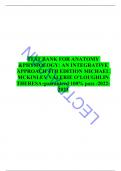Exam (elaborations)
Test Bank For Anatomy & Physiology: An Integrative Approach, 4th Edition by McKinley, Consists Of 29 Complete Chapters, ISBN: 978-1260265217
- Course
- Institution
- Book
Test Bank For Anatomy & Physiology: An Integrative Approach, 4th Edition by McKinley, Consists Of 29 Complete Chapters, ISBN: 978-1260265217 Test Bank For Anatomy & Physiology: An Integrative Approach, 4th Edition by McKinley, Consists Of 29 Complete Chapters, ISBN: 978-1260265217 Test Bank For Ana...
[Show more]




